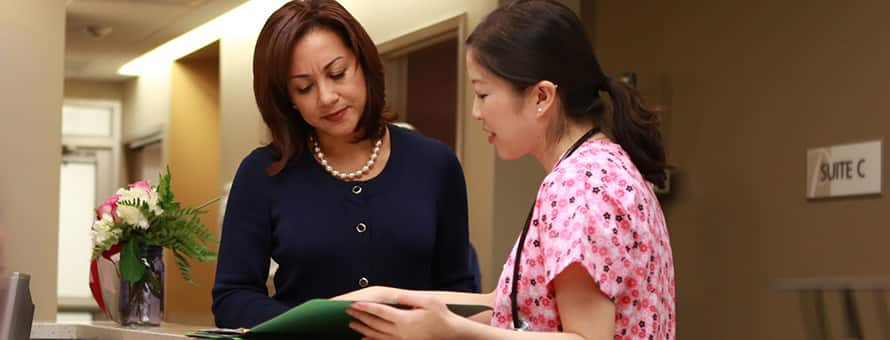What is a BSN? Is There a Difference Between an RN and a BSN?

Know before you read
At SNHU, we want to make sure you have the information you need to make decisions about your education and your future—no matter where you choose to go to school. That's why our informational articles may reference careers for which we do not offer academic programs, along with salary data for those careers. Cited projections do not guarantee actual salary or job growth.
Today, both the nursing profession and some employers are calling on registered nurses (RNs) to obtain a Bachelor of Science in Nursing (BSN) to improve safety and help prepare for future healthcare challenges. RN programs teach basic nursing skills that focus on nursing theory and clinical practice, whereas the BSN program expands on that.
Pursuing a BSN degree can introduce nurses to topics such as patient care technology, research, health promotion, safety and quality within the healthcare system, said Dr. Elizabeth Christman, DNP, RN, CNE, a clinical faculty member of nursing programs at Southern New Hampshire University (SNHU). As a Certified Nurse Educator and the 2020 recipient of the Daisy Award for Extraordinary Nursing Faculty, Christman is an expert on nursing education — and she encourages all nurses to earn a BSN.
What is a BSN Degree in Nursing?
BSN is the abbreviation for a Bachelor of Science in Nursing and refers to someone who has earned their bachelor’s degree in nursing. It often precedes the Master of Science in Nursing (MSN) program, which is available to BSN nurses who wish to further advance in their careers.
 "The BSN program typically covers a range of subjects, including anatomy, physiology, microbiology, chemistry, nutrition, psychology and other social and behavioral sciences, as well as nursing-specific courses," said Dr. Deborah Blackwell, PhD, WHNP-BC, RNC-OB, CNE, a clinical faculty member and team lead for SNHU's nursing program.
"The BSN program typically covers a range of subjects, including anatomy, physiology, microbiology, chemistry, nutrition, psychology and other social and behavioral sciences, as well as nursing-specific courses," said Dr. Deborah Blackwell, PhD, WHNP-BC, RNC-OB, CNE, a clinical faculty member and team lead for SNHU's nursing program.
Blackwell has a PhD in Nursing and has taught nursing students from pre-licensure to the doctorate level. She said an RN to BSN program — like SNHU's — is a bridge program designed for RNs who already hold a nursing diploma and want to obtain a BSN.
"These programs recognize the education and experience RNs already possess and provide a pathway to achieve a higher level of education without repeating foundational nursing courses," she said.
Should you choose to progress through the different levels of nursing degrees, you may also find you're able to specialize in the areas of nursing that interest you most.

What Does a BSN Do?
Below are some examples of nursing jobs that typically prefer a BSN:
- Charge Nurse: Nurses working in this leadership role oversee unit operations, monitor admission and discharges, and oversee the activities of the nursing and support staff, according to the American Nurses Association (ANA). They also may be involved in direct care.
- Military Nurse: Nurses who practice in a branch of the U.S. military treat service members and their families, monitoring wounds, prescribing medication and caring for them before, during and after surgery. In the interest of providing the best patient care and leadership, the U.S. Army, U.S. Navy and U.S. Air Force all require RNs to hold a bachelor's degree to practice as active-duty nurses, according to Nurses.org. In addition, the Veteran's Administration (VA), the nation's largest employer of RNs, also requires a bachelor's degree as the minimum education requirement necessary to be promoted beyond an entry-level role, according to the American Association of Colleges of Nursing (AACN).
- Nurse Case Manager: In this role, nurses oversee the healthcare needs of patients, acting as administrators of care. A nurse case manager works with both patients and their providers to develop a comprehensive care plan, NurseJournal notes. He or she also communicates with the patient’s health insurance company to determine eligibility for certain treatments or programs.
- Telehealth Nurse: The role of a telehealth nurse is to evaluate and aid patients remotely.
There is strong evidence that shows a BSN provides graduates the skills and education they need to grow as clinicians and make a significant impact in the nursing profession.
 For instance, SNHU's BSN program provides insight into several important aspects of healthcare, according to Dr. Lokelani Ahyo, DNP, RN, CNE, a clinical nursing faculty member at SNHU with over two decades of experience as a nurse. She said these include:
For instance, SNHU's BSN program provides insight into several important aspects of healthcare, according to Dr. Lokelani Ahyo, DNP, RN, CNE, a clinical nursing faculty member at SNHU with over two decades of experience as a nurse. She said these include:
- Leadership
- Population health
- Quality improvement
"In addition to the skills taught at a diploma or associates degree level, a BSN adds the conceptual foundation to answer the 'why?' nurses do what they do," Ahyo said.
How Long Does It Take to Become a BSN?
If you're an RN looking to earn your BSN, an RN to BSN program like SNHU's might be the fastest option. At SNHU, an RN license offers 45 credits toward a BSN degree. That's the equivalent of 15 courses. SNHU also accepts up to 90 transfer credits total, so you could go from an RN to a BSN in as little as one to two years, depending on how many credits you have left in your program.
If you're not an RN yet, you can earn your Associate Degree in Nursing (ADN) in a 2-to-3-year associate degree program and opt to further your education after you begin working as an RN (Note: SNHU does not currently offer an Associate Degree in Nursing).
Regardless of the nursing degree level, graduates must pass the NCLEX-RN© licensing examination.
 It's true that earning RN licensure often takes less time to complete than a BSN program, but if you're already a registered nurse, you may be able to complete an RN to BSN program without having to put your career on hold, Christman said. Completing your BSN online could allow you greater flexibility, too, as you won't have to spend time commuting to class at scheduled times each week. Instead, you can tackle assignments due each week at times that work for you.
It's true that earning RN licensure often takes less time to complete than a BSN program, but if you're already a registered nurse, you may be able to complete an RN to BSN program without having to put your career on hold, Christman said. Completing your BSN online could allow you greater flexibility, too, as you won't have to spend time commuting to class at scheduled times each week. Instead, you can tackle assignments due each week at times that work for you.
“One of the strengths of being an RN student pursuing a BSN is that you (could) are able to work as a nurse the whole time you are advancing your education. This provides a very affordable opportunity,” she said.
Ahyo agreed. In fact, that's what her own journey as a nurse looked like.
"Many nurses, myself included, completed an ADN degree, worked as a registered nurse, and then returned to complete a BSN degree in an online platform," she said.
Find Your Program
What is the Difference Between an RN and a BSN?
Whether you are an RN practicing with or without a BSN, your primary focus is on providing patient care. This includes performing physical exams and taking health histories, providing health counseling and/or education, administering medication and other treatments, as well as coordinating care with other health professionals, according to the ANA.
RNs with a BSN and an ADN can work alongside each other on the same medical team, carrying out similar duties. The difference is BSN-qualified nurses position themselves for a broader career path that can include administrative positions requiring leadership skills in areas such as research, consulting and education, according to the U.S. Bureau of Labor Statistics (BLS).*
 That's why Danielle Jernigan '23 earned her BSN from SNHU while working as a nurse. “I wanted to get my BSN so that I could apply for better jobs,” she said.
That's why Danielle Jernigan '23 earned her BSN from SNHU while working as a nurse. “I wanted to get my BSN so that I could apply for better jobs,” she said.
The program expanded her knowledge and galvanized her to pursue nurse leadership roles.
“Once I started my BSN program at SNHU, I became more motivated to seek leadership and management positions within nursing,” she said. “With each class I took, I was able to apply what I learned to my current practice and I could really see myself grow as a nurse.”
SNHU nursing programs are fully accredited by the Commission on Collegiate Nursing Education (CCNE) and comply with the guidelines and competencies of both the CCNE and American Association of Colleges of Nursing (AACN).
Online nursing degrees at SNHU also incorporate simulation technology, providing hands-on experiential learning in a virtual setting.
Ahyo said her own BSN program gave her a better understanding of both her role and potential as a nurse. " I was able to absorb the content and appreciate the information that I was learning," she said.
She noted that finishing her BSN also inspired her to keep moving forward in her nursing education.
BSN vs. RN Salary
![]() Registered nurses earned a median salary of $86,070 in 2023, according to BLS, with the caveat that those salaries vary widely according to the type of nurse specialty, geography, facility type and years of experience in addition to education.*
Registered nurses earned a median salary of $86,070 in 2023, according to BLS, with the caveat that those salaries vary widely according to the type of nurse specialty, geography, facility type and years of experience in addition to education.*
In contrast, BLS reports medical and health services managers need at least a bachelor's degree and earned a median of $110,690 in 2023.* Jobs for medical and health service managers are projected to grow 28% by 2032 — significantly higher than the average for all professions, according to BLS.*
A recent survey conducted by the AACN found that 40% of hospitals and other health care settings require new hires to have a BSN, while more than 77% of employers express a strong preference for nurses with bachelor's degrees (AACN PDF source).
Can I Become an RN Without a BSN?
Nursing is the largest health occupation in the United States today, providing many career options for RNs to practice in hospitals, clinics and private practices, according to the AACN.
The minimum requirements to become a nurse are that you graduate from a state-approved nursing program and pass the National Council Licensure Examination (NCLEX) – a standardized exam that each state board of nursing uses to license candidates for entry-level nursing practice, according to Nurse.org.
Earning an ADN before you begin a BSN program can launch you into the profession sooner. However, RNs are finding that a BSN can offer even more opportunities for career growth and satisfaction beyond RN licensure.
In 2011, the Institute of Medicine (IOM) released its report, “The Future of Nursing: Leading Change, Advancing Health,” which called for increasing the number of nurses with bachelor's degrees to 80% by 2020. Although the number of nurses with bachelor's degrees has not yet reached the 80% threshold called for by the IOM, that percentage finally seems to be within reach.
 The National Advisory Council on Nurse Education and Practice (NACNEP) called for at least two-thirds of the nurse workforce to hold baccalaureate (bachelor's) or higher degrees in nursing — and that goal has now been met. As of 2023, over 70% of nurses had a BSN or higher degree — an all-time high.
The National Advisory Council on Nurse Education and Practice (NACNEP) called for at least two-thirds of the nurse workforce to hold baccalaureate (bachelor's) or higher degrees in nursing — and that goal has now been met. As of 2023, over 70% of nurses had a BSN or higher degree — an all-time high.
In addition, the state of New York now requires all nurses to earn a BSN within 10 years of receiving an initial RN license as a result of the state's “BSN in 10 Law.” The impetus behind the law is “the result of a growing body of research evidence that additional education results in better patient outcomes.” New Jersey also currently working on implementing a “BSN in 10 Law” according to the New Jersey Hospital Association (NJHA PDF Source).
The complexity of healthcare and the need for strong leadership calls for nurses to sharpen their skills in management and research in years to come, Christman said.
So, what degree do you really need to be a nurse? It comes down to your career goals.
“As a BSN, you have more opportunities than your RN counterparts. You can step up to a leadership position, move into nursing education, work in public health and focus on health education within the community, or even go on to pursue a nurse practitioner or nurse administrator degree,” Christman said.
Discover more about SNHU's RN to BSN degree: Find out what courses you'll take, skills you'll learn and how to request information about the program.
*Cited job growth projections may not reflect local and/or short-term economic or job conditions and do not guarantee actual job growth. Actual salaries and/or earning potential may be the result of a combination of factors including, but not limited to: years of experience, industry of employment, geographic location, and worker skill.
Krysten Godfrey Maddocks ’11G is a writer who covers K-12 and higher education topics, including policy and the role of digital technology in education. She spent almost a decade working in various marketing roles at an educational assessment company before launching a strategic marketing company. Maddocks earned a master's degree in marketing from Southern New Hampshire University and a bachelor's degree in English/ journalism from the University of New Hampshire. Connect with her on LinkedIn.
Explore more content like this article

The Importance of Health Education

SNHU Spotlight: Philip Hensarling, BS in Healthcare Administration Grad

SNHU Spotlight: AnnMarie Kulis, MS in Healthcare Administration Grad
About Southern New Hampshire University

SNHU is a nonprofit, accredited university with a mission to make high-quality education more accessible and affordable for everyone.
Founded in 1932, and online since 1995, we’ve helped countless students reach their goals with flexible, career-focused programs. Our 300-acre campus in Manchester, NH is home to over 3,000 students, and we serve over 135,000 students online. Visit our about SNHU page to learn more about our mission, accreditations, leadership team, national recognitions and awards.

